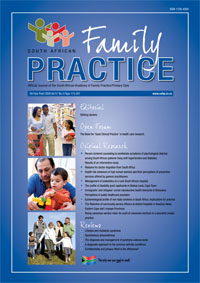Epidemiological Profile of Non-Daily Smokers in South Africa: Implications for Practice
Keywords:
Non-daily smoking, socio-demographics, quit attempts, smoking cessation, harm reduction
Abstract
Objective: This study sought to provide an epidemiological profile of non-daily (ND) smokers in South Africa. Method: Using data obtained from the 1998 South African demographic and health survey (SADHS) - the largest nationally representative dataset available, smokers were classified as non-daily (ND) smokers or daily smokers. NDS were defined as persons aged 18 and over who had ever smoked 100 cigarettes, but does not currently smoke daily. Results: In 1998, an estimated 10% of current smokers were ND smokers (n=255). Of the ND smokers, 69.7% had smoked daily in the past and currently smoke significantly fewer cigarettes on the days (CPD) they smoke than current daily smokers (5.4 vs. 9.8). ND smokers were also significantly more likely to have made at least one attempt to quit smoking, live in smoke-free homes, have >12 years of schooling and live in urban areas. Compared to past daily ND smokers, never daily ND smokers smoked fewer CPD and were more likely to be younger than 25 years. Conclusions: This study’s findings suggest that the majority of ND smokers in South Africa are those trying to quit smoking rather than those initiating smoking. Smoking rates among ND smokers are still at a level that have been shown to pose significant health risks, therefore health practitioners should also prioritise non-daily smokers for smoking cessation intervention.
Published
2009-04-25
Section
Original Research
By submitting manuscripts to SAFP, authors of original articles are assigning copyright to the South African Academy of Family Physicians. Copyright of review articles are assigned to the Publisher, Medpharm Publications (Pty) Ltd, unless otherwise specified. Authors may use their own work after publication without written permission, provided they acknowledge the original source. Individuals and academic institutions may freely copy and distribute articles published in SAFP for educational and research purposes without obtaining permission.

